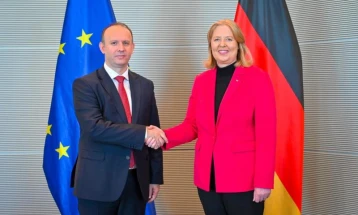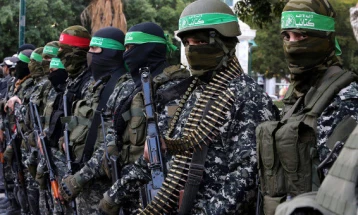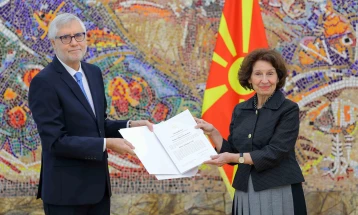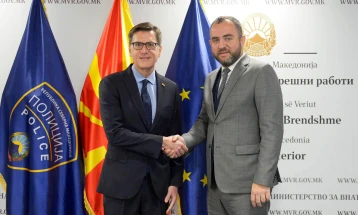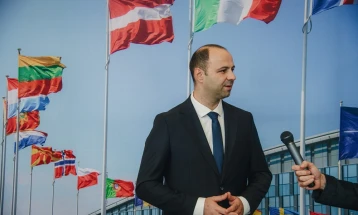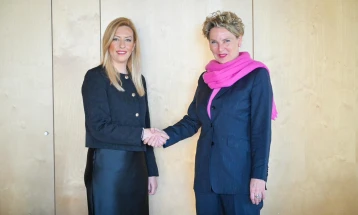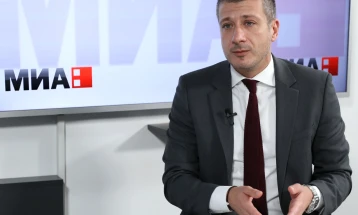Day two of NATO ministerial meeting with Defence Minister Misajlovski in attendance
- The two-day NATO defence ministers meeting in Brussels continues Friday, with the Macedonian Defence Minister Vlado Misajlovski also taking part.
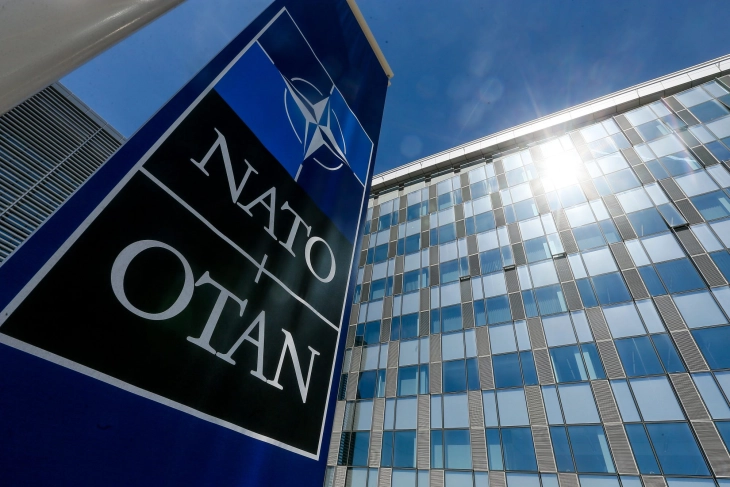
Brussels, 18 October 2024 (MIA) - The two-day NATO defence ministers meeting in Brussels continues Friday, with the Macedonian Defence Minister Vlado Misajlovski also taking part.
A meeting of the North Atlantic Council in defence ministers’ session is planned for today’s continuation of the ministerial meeting, where discussions will focus on strengthening NATO's defence and resilience, defence expenditures, and the situation in the Western Balkans.
In the first session of the two-day meeting, Defence Ministers met in an expanded format that for the first time included partners Australia, Japan, New Zealand and South Korea, as well as the European Union.

On the first day of the meeting on Thursday, a ministerial meeting took place with the members that contribute to the Global Coalition to Defeat ISIS, along with a meeting between NATO defence ministers and their partners Australia, Japan, South Korea, and New Zealand, and discussed enhancing cooperation in several areas, especially in the fields of innovation, industrial production, and the fight against hybrid threats and cyberattacks. In addition, a session of the NATO-Ukraine Cooperation Council took place in the form of a working dinner, with the participation of Ukrainian President Volodymyr Zelensky and Defence Minister Rustem Umerov.
At a joint press conference with NATO Secretary General, Mark Rutte, before the Cooperation Council meeting, Zelensky stated that extending an invitation to Ukraine to join the Alliance would strengthen the country politically and, more importantly, bring it closer to a real and just peace.
“Everything Ukrainians have achieved so far seemed impossible not so long ago. Ukraine has withstood Russia's full-scale attack and is defending against the invasion. And we remain united, as does Europe, and we are boosting our defence capabilities and weapons production and coordinating like never before,” Zelensky noted.
He expressed thanks for the ongoing support for his country, which, as he pointed out, is crucial for the lives of Ukrainian soldiers in the field, stressing that Ukraine knows how to achieve its goals in cooperation with its partners.

According to Zelensky, Ukraine truly deserves to become the thirty-third NATO member one day. And we must do everything to ensure this happens.
“That is why the first fundamental point in the victory plan is the invitation to NATO. Ukrainians have shown that we can defend shared values. And we are standing against Russia, the biggest threat to Europe and global peace, in our revolutions, we've proven that we truly value democracy,” Zelensky underlined.
“I look forward to the day that Ukraine is here as a member of this Alliance. And until then, we will continue to do all that we can to ensure Ukraine prevails. This is vital for our shared security,” Rutte underlined.

“So NATO is working with Ukraine – bringing you ever closer to the Alliance. And we are also working with other partners to bolster security for us all. We just concluded before the President arrived the first session of our NATO Defence Ministerial with a meeting that included the European Union and our Indo-Pacific partners. And of course, Ukraine was also high on the agenda of that meeting,” he said.
According to Rutte, the war in Ukraine has shown that instability in Europe can have far reaching consequences across the world. And that countries thousands of miles away – as far away as Iran, China and even North Korea – can become security spoilers in our own backyard.
So we must be clear-eyed in our assessment of the challenges we face. And we must work with our like-minded partners to address our shared challenges and uphold our common values, Rutte noted, adding “I want to take this opportunity to thank our Indo-Pacific partners and the EU for their outstanding support for Ukraine, including today the announcements made by Australia about [the] delivery of tanks to Ukraine. We are determined to work ever more closely together to defend our democratic values. And to promote a world based on the rule of law, not the rule of force.”

Rutte also stated that NATO will continue to support Ukraine for as long as necessary, which serves as a message to Russian President Vladimir Putin that the support for the country will last until conditions are created for peace negotiations with Russia.
On Thursday he said that Kyiv can rest “absolutely assured that 32 allies are united in making sure that collectively, we will do whatever is needed to make sure that Ukraine can prevail, that (Russian President Vladimir) Putin will not get his way.”
Earlier, upon arriving at the ministerial meeting, Rutte emphasized that we must be aware of the situation in the Western Balkans, especially as the EU-mediated dialogue between Belgrade and Pristina is not progressing as desired, and there are secessionist tendencies aimed at dividing Bosnia and Herzegovina. He added that this is precisely why the Alliance will do everything possible and express its support for the region.

He highlighted that everyone is aware that the current defence spending by NATO member countries is not sufficient and announced that today’s session of the North Atlantic Council, as well as future meetings of the allies, will include discussions on increasing defence spending.
“But you all know we stand ready now, but if you want to be standing ready for the longer term, we have to ramp up our money, our defence spending,” Rutte said.
Secretary of Defense Lloyd J. Austin III highlighted three lessons that he views as key to ongoing success against global terrorism while speaking at NATO's Ministerial of the force contributing members of the Global Coalition to Defeat ISIS, or D-ISIS, in Brussels.

“Today's strategic environment is very different from that of 2014. ISIS remains focused on us. But the threat from ISIS and other terrorist groups is now one of several strategic priorities for us," Austin said, while addressing the topic of vigilance and resoluteness.
"We're tackling a range of key challenges, including bullying from the People's Republic of China and Russia's reckless invasion of Ukraine," he continued. "But as we do so, we must not lose sight of the threat that ISIS still poses. So, this ministerial underscores our shared vigilance, and our shared resolve."
"But our coalition has undermined their strategy to outlast us," he continued. "Together, we've shared the responsibility for the territorial defeat of ISIS in Iraq and Syria. And together, we have the global presence and resources to confront ISIS wherever it may emerge."
He said that continued success against ISIS — and continued successful global counterterrorist efforts, overall — will require vigilance and resoluteness regarding transnational terrorism; an ongoing collective response to terrorist aggression; and understanding the importance of adaptability.
Photo: MIA archive

